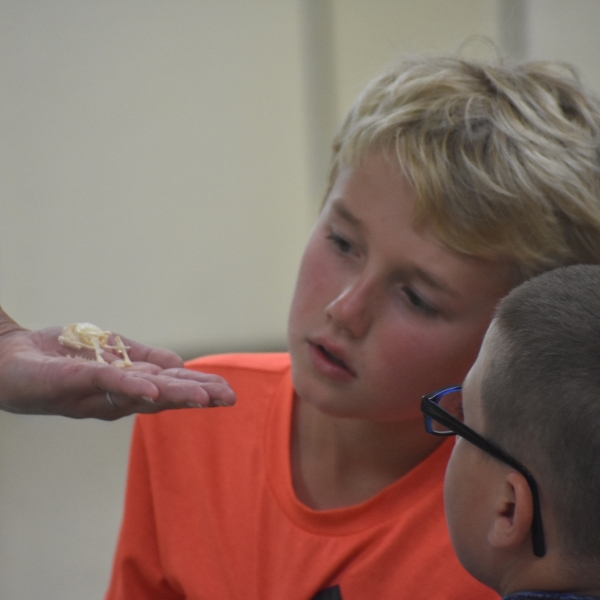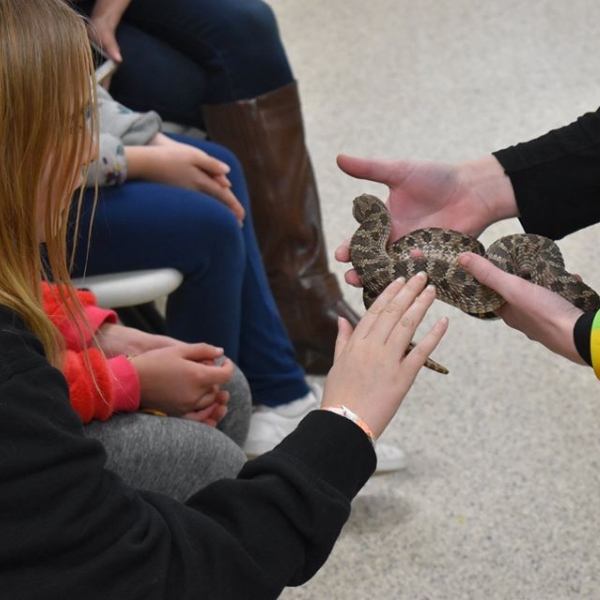The NEW Zoo offers a variety of classes that support national as well as Wisconsin state educational standards. We love to supplement and reinforce teacher curricula in innovative ways! Our Classes and Tours are not just for school groups. We welcome daycares, senior living centers, summer camp programs, homeschool groups, families, and more. Programs are tailored to meet the needs of any audience and incorporate live animals, biological artifacts such as feathers, furs, and bone replicas, and more. Both kids and adults alike are guaranteed to have an edZOOcational experience you won’t forget!



Pricing
We welcome both students and adults to our zoo programs when paying the program fee, and class fees apply to everyone aged 2 and above. All chaperones should be included in your headcount and in your payment if they plan to come into the classroom for the program. Chaperones that attend a field trip and do not want to pay the program fee can visit the Zoo’s nearby animal habitats during the class session.
Standard Zoo Class
$3 per person
Minimum $30 session fee (even with fewer than 10 participants)
Custom Zoo Class/Tour
$5 per person
Minimum of $50 per session fee (even with fewer than 10 participants)
Minimum of three weeks’ notice required for custom program requests
Repeat Annual Custom Class/Tour*
$4 per person
Minimum of $40 session fee (even with fewer than 10 participants)
*Price applies when the same teacher/leader is bringing a new group out for the same customized class in future years/semesters
Program Duration
- Standard length is 30 minutes for 1st grades and under
- Standard length is 45 minutes for 2nd and above
- Some exceptions to these lengths noted below
Program Topics
Our classes provide students with unique educational opportunities in understanding a variety of science concepts including interdependence, environmental changes, animal habitats and adaptations, conservation, and more. We can adapt our programs (listed below) for nearly any age group. We can also create a custom program specifically for your class. Zoo Classes take place indoors, in our Education & Conservation Center Classroom.
Standard Classes
Animal Storytime (ages 5 and under)
Best for ages 5 and under, this 30-minute program is specially designed for our youngest audiences. We’ll share one or two animal-themed story books with the children, then introduce the audience to several different live animals – some of which they may be able to touch (depending upon audience age and other factors determined day of the program). Can accommodate up to 35 participants. If you have a larger group, we recommend you split into smaller groups.
Fur, Feathers, Shells & Scales (PK, 5K, 1ST)
Best for preK to 1st grade, this 30-minute program provides a fun, basic introduction to animal classification (ex. mammals vs reptiles vs birds, etc.) by focusing on “what animals wear.” Can accommodate up to 60 participants.
Creatures Have Class (1ST, 2ND)
Recommended for grates 1 and 2, this 45-minute presentation focuses on animal classification and introduces students to four of the five different groups of vertebrates (with a bonus introduction to invertebrates!). We’ll learn about the similarities and differences between the groups and how to tell them apart. Can accommodate up to 60 participants.
Home Sweet Habitat (1ST-4TH)
Recommended for grades 1 through 4, this 45-minute presentation defines what a habitat is, and then takes students around the world as we discover different habitat types and the variety of animals that are found within them. Can accommodate up to 60 participants.
Animal Adaptations (4TH AND UP)
Recommend for grades 4 and above (great for adults, too!), this 45-minute presentation defines both physical and behavioral adaptations and shares examples of how animals use those adaptations to survive in their environments. Can accommodate up to 60 participants.
Conservation Connection (6TH-8TH)
Recommended for grates 6 and up, this 45-minute presentation examines five of the major causes of species endangerments and extinctions worldwide. Included is discussion of actions that students themselves can take (and encourage others to take!) to make a difference in protecting animals and their habitats around the world. Can accommodate up to 60 participants.
Wild Careers (9TH-12TH)
Recommended for grades 9 and up, this 45-minute class shares information about career options for people interested in working with animals in the “zoo world.” Included is discussion on what students can do to prepare themselves now for an animal career in the future. Can accommodate up to 60 participants.
Standard Zoo Tours
A Zoo Tour takes place out in the zoo, walking around animal habitats. There will be other guests walking around, too – so because of those distractions, we recommend Zoo Classes for high school students, university students, and groups of adults only. The Zoo Classes listed above are a better fit for younger audiences. Zoo Tours are $4 per person, with a minimum of $40 per session (even with fewer than 10 participants).
Endangered Species (10TH AND UP)
This 60-minute experience is best for high school students and adults, in groups of no more than about 20-25 people. Journey with us around the Zoo to learn about the endangered species that live here and how the NEW Zoo works to protect these animals from extinction. Includes questions-and-answer sessions, as well as discussion of the zoo’s participation in SAFE: Saving Animals from Extinction, endangered species breeding programs, conservation efforts, and more. Can accommodate up to 25 participants.
Custom Classes
If your students are learning about a specific theme or topic you’d like reinforced, let us know! Just about any idea that relates to animals is open for discussion! We’ve done custom classes on genetics, the physics of flight, metamorphosis, cold-weather animal adaptations, food chains, and more! Costs start at $5 per person with a minimum fee of $50 per session (even with fewer than 10 participants). REPEATER BONUS: If you bring another group for the same custom program in the future, the fee will be just $4 per person. Can accommodate up to 60 participants.
Request Custom Class90-Minute Class Experiences
*Great for Team-Building!*
Recommended for grades 3 and up, our “See an Animal, Be an Animal” classes combine learning with action! Students will meet animals up-close while learning about your chosen topic, then do interactive, hands-on activities. A minimum of 15 participants and maximum of 30 participants are allowed per program session (not including chaperones). Fees are $10 per participant and $5 per chaperone (minimum of $150 per session). Zoo admission is optional: program attendees do not need to pay admission to the NEW Zoo to participate; if you choose not to add admission to your visit, our staff will walk your group members to and from the entrance building to the program location.
On The Move (3RD-4TH)
Recommended for grades 3 and 4; students will see animals up-close, watching and learning about how they move and navigate through their native habitats. Then, we’ll make comparisons to how humans move and travel. Students will practice their own movement skills, focusing on balance. Can accommodate 15 to 30 participants.
Think About It (5TH AND UP)
Appropriate for grades 5 and up. During this program, students will learn about the ways that animals adapt to challenges in their environments through live animal demonstrations. Then, we’ll compare those skills and traits to the ways that humans solve problems. Participants will practice their own problem-solving skills through hands-on, team-building games and activities. Can accommodate 15 to 30 participants.
